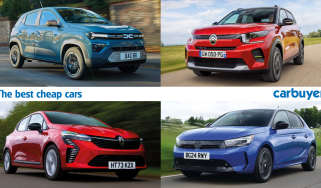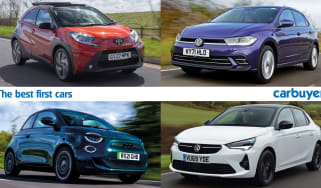Hyundai i10 micro car (2008-2010)
"The Hyundai i10 is as cheap as chips to run and is well equipped, but it lacks a diesel option.
Pros
- Cheap to buy and run
- Spacious interior
- Enjoyable to drive
Cons
- Dash looks and feels cheap
- Only two small engines to choose from
- Lacks power on the motorway
The Hyundai i10 is a great choice for anyone looking for fuss-free transport around town. It's easy to drive and the dashboard is well laid out and simple to use. Running costs and list prices are as low as it gets for a new car, and the cabin is roomier than you might expect, so it's a great, all-round budget buy. Hyundai's excellent reliability record and generous five-year warranty mean you can buy with confidence, too.
MPG, running costs & CO2
No i10 could ever be called expensive to run. The 1.1-litre model will average 58.9mpg and emits 114g/km of CO2, which means £30 annual Road Tax. You'd struggle to notice the difference in running costs between the engines though, as the 1.2 returns 57.6mpg and costs no more to tax than the 1.1. The only difference is that the 1.2 can be had with an automatic gearbox, which is significantly thirstier at 47.9mpg, while emissions of 139g/km mean it costs £100 a year in Road Tax. Insurance is very cheap - groups range from nine to 11, depending on the exact model.
Engines, drive & performance
Light, accurate steering, soft suspension and strong engines combine to make the Hyundai i10 an enjoyable car to scoot around town in. At low speeds it’s comfortable, and quiet. Neither 1.1 or 1.2-litre petrol engine is particularly quick, but in the cut and thrust of city traffic, both are fast enough to keep you at the head of the queue for that last parking space. The i10 isn’t bad on the motorway, but the engines need to be worked hard to keep pace with other traffic.
Interior & comfort
Bumps and potholes pose little threat to the Hyundai i10, as the suspension is tuned for comfort, and deals with rough roads very well. The small engines are quiet around town, but get noisy at speed. Interior space is surprisingly generous, so even two adults will be able to sit comfortably in the rear, and the i10's tall roofline means that there's plenty of headroom.
Practicality & boot space
For its size, the Hyundai i10 has quite a large boot, at 225 litres. It comfortably trumps rivals like the Chevrolet Spark with 170 litres and the Nissan Pixo with 129 litres, and it matches the Daihatsu Sirion exactly. The i10 is only available as a five-door, which is more practical, and the doors are quite wide, so access is easy. Comfort and Style models get under-floor storage in the boot where you can store valuables out of sight.
Reliability & safety
This is a strong point for Hyundai, as the company has an excellent five-year, unlimited mileage warranty. The quality of the cabin materials isn’t great, but the i10 is a cheap car, so it's acceptable for the price you pay. Reliability problems are unlikely, as Hyundai has such a good record for durability. Although the i10 is didn't feature in the 2010 Driver Power Survey, Hyundai came sixth out of 35 manufacturers and the i10's bigger i30 relative took overall honours in the individual car category.
Price, value for money & options
It's difficult to find a cheaper car than the i10 because list prices are so low. There are a few with lower starting prices, like the Kia Picanto, but none can offer the i10’s big-car extras, such as heated seats and an electric sunroof. The Hyundai's low cost means that it can only lose so much of its value second-hand, and small, economical cars are in favour with used buyers, so it’s a sound investment.













